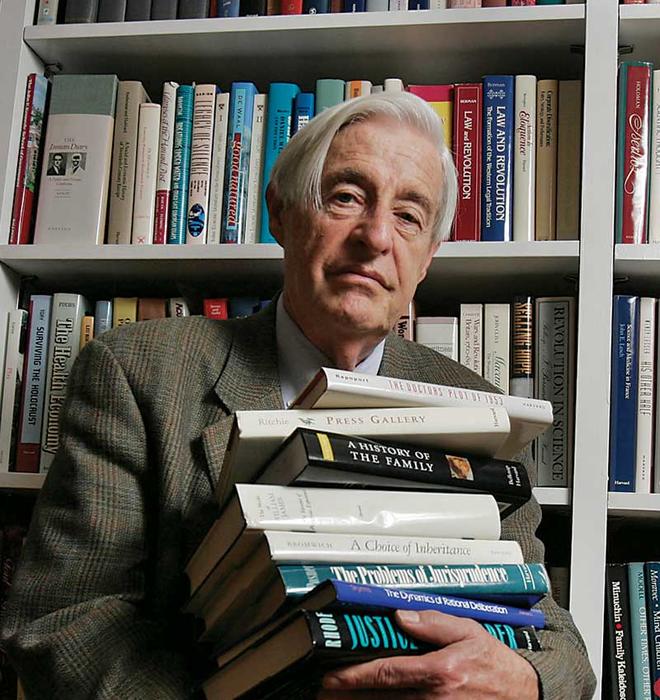
An eminent political scientist, winner of awards too numerous to list, and longest-serving director of the Harvard Library, Sidney Verba *59 was not too big to operate the office photocopier or make a pot of coffee for his library staff.
“Verba treated everyone — from Nobel Prize winners to undergraduate research assistants — with the same warmth, decency, and respect,” recalls Boston College political science professor Kay Schlozman in an email.
“Sid was a brilliant political scientist, but more important he was a brilliant human being,” wrote Joseph Nye ’58, former dean of Harvard’s Kennedy School, in a tribute to Verba. “He could be the smartest person in the room but somehow make everyone else think they were. His humor, low-key style, and genuine interest in others made us all want to be with him.”
As a political scientist and research professor, Verba, who died March 4, was an innovator in using survey data to study comparative political behavior. Beginning with The Civic Culture (1963), which he co-wrote while studying for his doctorate in politics at Princeton, Verba went on to publish more than 20 books exploring civic engagement and activism in democracies around the world.
Verba’s work was driven by his desire for all citizens to participate in civic and political life, Gary King, co-author with Verba of Designing Social Inquiry, told The Harvard Gazette. “If you had to say one word that Sid was about, it was equality. ... He showed very often that the poor, even though they officially have the same number of votes as the rich, they have much less say in what goes on in government.”
Verba applied his egalitarian philosophy to the Harvard Library, where he was director from 1984 to 2007. Taking over at the dawn of the digital age, he applied emerging technologies to how libraries access, store, and use information. He worked with Google to digitize Harvard’s public-domain collection, and offered free pedagogical packages of digitized documents to teachers everywhere.
While heading the library, Verba taught government at Harvard and continued his academic research. When colleagues marveled at how he could do it all, Schlozman, who worked with Verba for more than four decades, says that Verba would deadpan, “There is nothing in life that is worth doing that’s not worth doing superficially.”
“Sid always got a point across by slipping it into a joke,” says Princeton professor emeritus Robert Darnton, who succeeded Verba as Harvard Library director, “and his wit was so lively that he could win over anyone without bruising egos — quite a skill at a place like Harvard.”
Harvard administrators recognized Verba’s talent for bringing people together, so they frequently chose him to chair what became known as “Verba committees” — groups tasked with solving problems that seemed unfixable. “Sid lived the lessons of his research,” Schlozman told the Gazette. “He allowed people to have a voice in an equal way ... and he knew how to get people to come to some kind of consensus with no one feeling left out.”
Fran Hulette is a former PAW Class Notes editor.
MAY 26, 1932 | MARCH 4, 2019






No responses yet